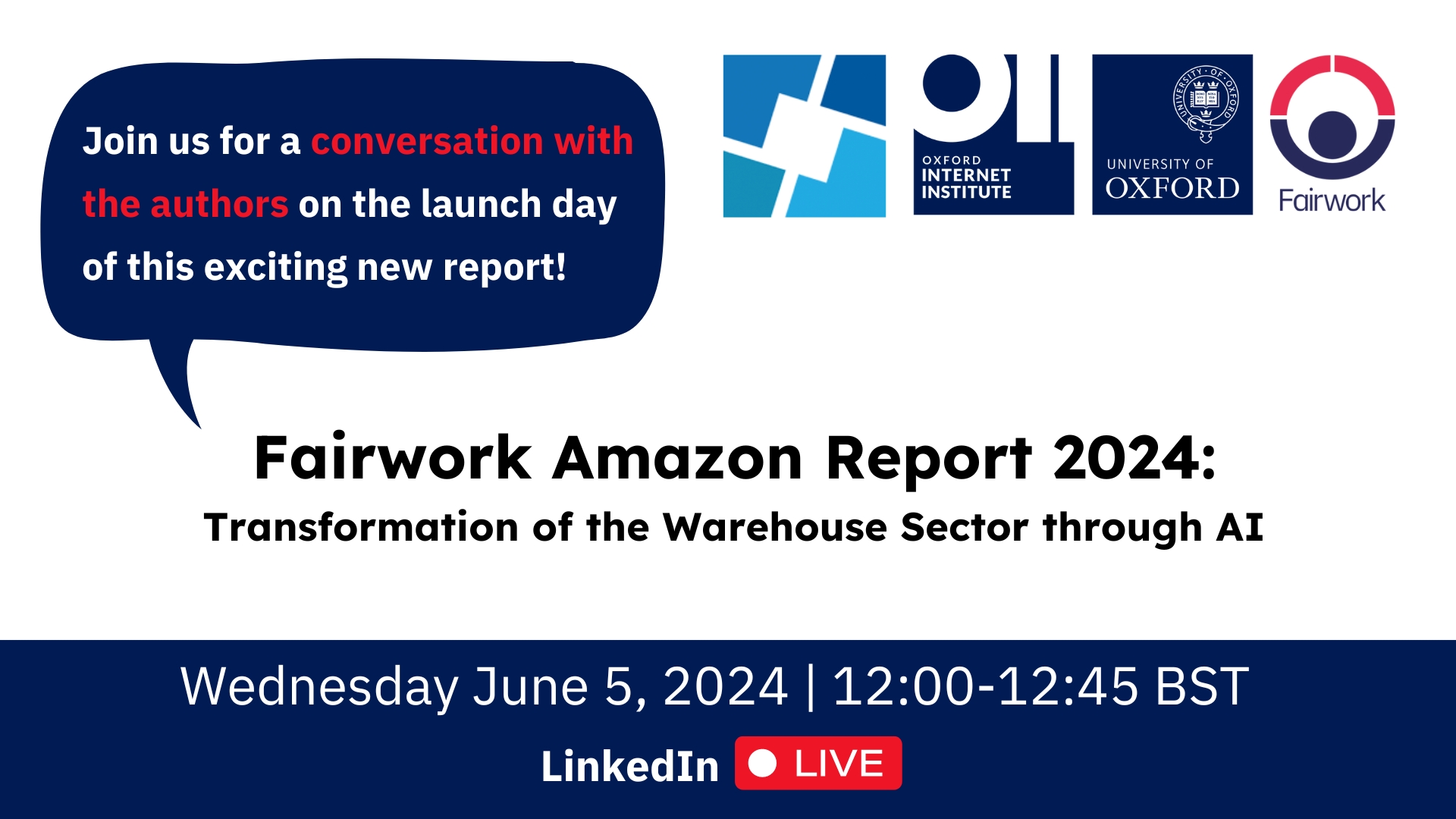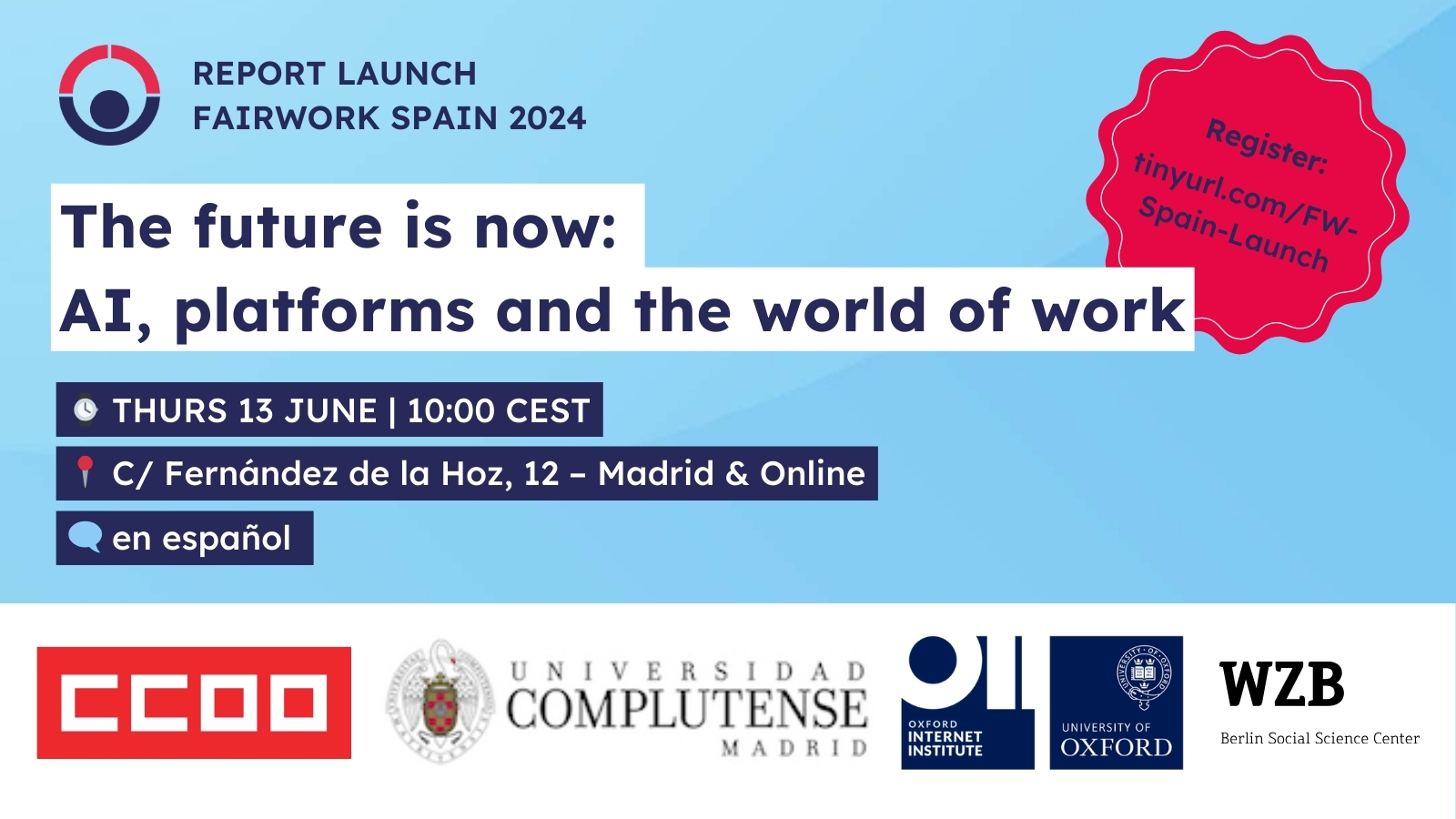Fairwork Newsletter June 2024

Welcome to the Fairwork newsletter, bringing you the latest insights on the platform economy and the future of work.
In this issue we bring you:
3️⃣ Things We’re Looking Forward To
5️⃣ Things We’re Proud Of
🔟 Things We’re Reading
3️⃣ Things We’re Looking Forward To

Fairwork and the Global Partnership on Artificial Intelligence (GPAI) are publishing a new report. Technologies like AI and robotics are meant to improve efficiency and allow for the ever-faster delivery of consumer goods from Amazon warehouses; but at what cost?
Tune in for a conversation with the authors of a new report about the AI-induced transformation of the warehouse sector.
Watch the Event:

Fairwork is launching its first-ever Spain Report. In this new report, researchers from Complutense University of Madrid (UCM) and the University of Oxford reveal the best and worst practices in the gig economy in Spain. Join the launch event, hosted by Comisiones Obreras (CCOO), to hear more from the researchers, as well as from union and government representitives. Register for details on how to attend.

Fairwork is hiring a project manager. We’re looking for someone with outstanding strategic, operational and financial skills, and experience managing complex projects. In this role, you’ll have the opportunity to work with a passionate global team on cutting-edge action research that is driving positive change in the digital economy. Sound like you or someone you know? Apply today or share the job with your networks.
5️⃣ Things We’re Proud Of
Fairwork recently celebrated the 300th improvement in working conditions in the platform economy as a direct result of the project. Following engagement with our Cloudwork team, ComeUp, an online remote work platform focused on freelance content-creation-related jobs, added a new clause to their Terms of Service that recognises workers’ freedom of association and the importance of collective bargaining. This marked the 300th pro-worker change in a company’s policy as a direct result of Fairwork. In the coming months, we will continue to engage with platforms to incentivise pro-worker changes to policies and practices in our efforts to ensure all workers have decent rights and protections.
Fairwork collaborated with #BreakFreeFromPlastic to propose 10 recommendations for the potential shift towards reusable packaging in the delivery sector. These recommendations are the outcome of discussions between the #BreakFreeFromPlastic team and Fairwork’s Funda Üstek, Oğuz Alyanak, and Adam Badger. They are meant to help guide us towards a future where both workers and the environment are treated with fairness and respect.
The UK’s latest Digital Development Strategy 2024-2030, states their intention to complement Fairwork’s research through their programming on the digital transformation of labour markets. In March, the UK’s Foreign, Commonwealth & Development Office published a new strategy which lays out their plans to support the development of digital technologies in the majority world. Given that the strategy is underpinned by the UK’s commitment to fair digital ecosystems, it makes sense that it also commits to improving regulations and industry standards in the gig economy. It directly cites Fairwork’s efforts as something their government will build upon.
Fairwork’s US Principal Investigator, Katie J. Wells, gave testimony before the U.S. House of Representatives based on findings from Fairwork research. The presentation, made in front of the Committee on Education & the Workforce Subcommittee on Workforce Protections, addressed the individual and systemic costs and risks of misclassifying platform workers as self-employed. On the individual side, it excludes many workers from the protections of local, state, and federal law such as minimum wage, overtime pay, workers’ compensation, retirement benefits, employment-based health insurance, and paid sick days. On the systemic side, it costs governments at all levels the contributions they should be owed by lucrative platform companies for public service and safety net programs.
Fairwork posters were used during a Western Cape E-hailing Association (WCEA) strike for fairer working conditions in the ride-hailing sector in South Africa. Over the past two years, Fairwork has worked with local designers to produce posters that speak to the five Fairwork principles and highlight how working conditions can be improved for platform workers around the world. We were proud to see that these posters were put into use to disseminate information about workers’ rights.
🔟 Things We’re Reading
TOPICS: 🚗 Location-Based Platform Work | 🤖 AI & BPO | 🧠 Related Issues
Written by Fairwork Researchers & Collaborators
🚗 This new report from Fairwork Uruguay: This report presents the first assessment of digital labour platforms in Uruguay, where the emergence of digital work platforms has broken with the country’s tradition of strong social and labour regulations.The digital labour platforms in Uruguay are limited to just a few companies so far and mainly focus on the transport of people and the delivery of goods, like food, pharmaceuticals, or general products. In 2023, the Fairwork Uruguay team interviewed workers and managers at five platforms in the delivery, parcel delivery, and passenger transport sectors that operate in Montevideo: Cabify, PedidosYa, Rappi, SoyDelivery, and Uber. Find out how they scored across the five Fairwork principles.
🚗 This Policy Brief written by worker and union representatives from six African countries: It outlines five key challenges platform workers in Africa face and offers practical interventions that regional institutions and national government agencies should take to tackle them. It is a must-read for anyone interested in learning more about working conditions in the Majority World.
🚗 This Policy Brief on legal reforms the Philippine government could implement to improve the platform sector: The report provides an overview of the legal landscape in The Philippines and presents various scenarios for the regulation of platform work in this context—from most to least desirable. It is meant to complement the past two years of Fairwork ratings reports in The Philippines by providing concrete and context-specific policy recommendations for the government. It was written by Jayvy R. Gamboa, a lawyer on the Fairwork Philippines team.
🤖 This academic article, which provides a new typology for understanding how human labour is integrated into the production of AI systems: It aims to dispel confusion around the various types and categories of labour along the “artificial intelligence pipeline”, from data preparation to model evaluation. It was written by Fairwork researchers James Muldoon, Callum Cant, and Mark Graham.
Where Fairwork Researchers & Collaborators are Cited
🚗 This series on “Graying Gig Workers” in Rest of the World: It profiles the growing number of older folks around the world—from Latin America to Africa, South Asia, and Southeast Asia—who are turning to gig work and explores the unique challenges they face. And bonus! Fairwork reports and researchers are cited in most of the articles.
🚗 This news article about the risks extreme heat poses to workers’ health: It outlines how most countries are not doing enough to protect workers from the more and more frequent instances of extreme heat caused by climate change. Fairwork researcher Oğuz Alyanak is quoted in this article.
Recommended by Fairwork Researchers
🤖 This coverage from Wired, The Washington Post, Tech Policy Press, The Hill, and The Star, of Kenyan data workers’ letter to US President Biden: While Kenyan President Ruto was the US, pitching Kenya as one of the largest emerging tech hubs in the world, 90+ tech workers wrote a letter to President Biden demanding he pushes Big Tech and Ruto to improve working conditions in their sector.
🤖 This article about Syrian refugees working as AI data labelers in Bulgaria: It argues against the “belittling” of AI data work, which in fact, requires immense skill and, importantly, contextual knowledge like familiarity with certain landscapes. This makes some groups of displaced people particularly useful to big tech firms. The piece also explores workers’ ethical concerns over privacy and how the data they produce will be used. It was written by Milagros Miceli, who leads the research group Data, Algorithmic Systems, and Ethics at the Weizenbaum-Institut.
🧠 The OECD’s “Digital Economy Outlook” for 2024: It shows just how rapidly the digital economy as grown in recent years—about three times faster than the total economy across OECD countries between 2013 and 2023. Nonetheless, significant gaps remain between the countries where growth in this sector has been the fastest and slowest. The report provides insights and data to help policymakers design effective policies to harness the many opportunities provided by digital technology while also mitigating the very real risks it could pose.
🧠 This piece about the role worker cooperatives should play in the political strategies of the Left: It argues that the modern-day “organized left” is not adequately leveraging the solidarity economy to support its electoral work, union drives, etc. The article provides both historical and contemporary examples that point to the complementary role worker-owned enterprises should play to other kinds of organizing in this political sphere. It is written by researcher and educator Daniel Wortel-London.
Thanks for reading!
Until next time,
Your Fairwork Team
If you have thoughts on this newsletter, suggestions for our next edition, or questions about Fairwork, please don’t hesitate to get in touch with Fairwork Communications Manager, Zoe Johnson at zoe.johnson@wzb.eu.